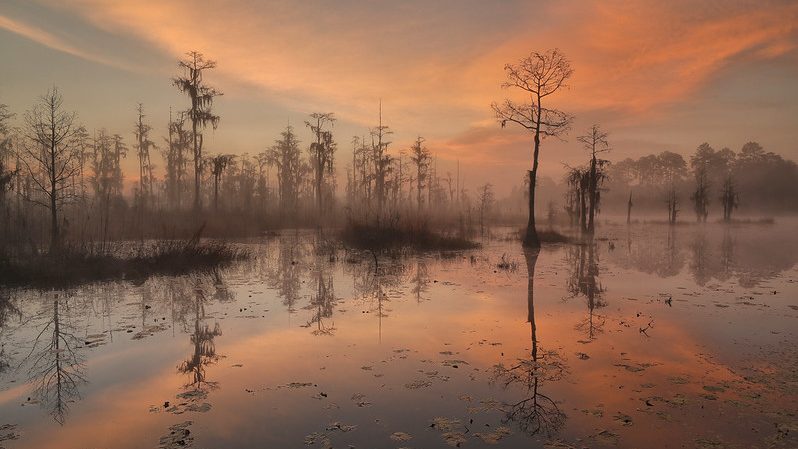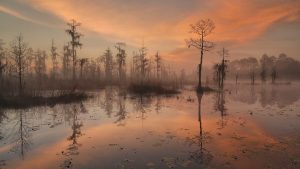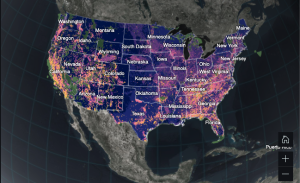March 2020 Newsletter

March 2020 Newsletter
Welcome to the Southeast Climate Adaptation Science Center’s March 2020 Newsletter.
For news and upcoming events related to the Southeast Climate Adaptation Science Center,
subscribe to our monthly newsletter.
SE CASC News | Resources | Publications | Tribal News | Partner News | Webinars | Events | Opportunities

Southeast Climate Adaptation Science Center News

The final webinar in our NCA4 Webinar Series, presented by Rachael Novak (Bureau of Indian Affairs) and Casey Thornbrugh (United South and Eastern Tribes), on the Tribes and Indigenous Peoples chapter of the NCA4 will be on March 25 from 12pm – 1pm ET. Register here.
The second Global Change Seminar was successfully held on March 5th on the topic of Faith and Reasoning in Climate Change Views. View a recording of this great discussion here.
The final Global Change Seminar of the semester, organized by our Global Change Fellows will be on April 9, 3:30pm ET. Presentations and discussion on the topic Human Adaptation to Climate Change in Urban Environments will be via Zoom connection.
Join us for the first webinar in a Spring/Summer Science Series brought to you by the SE CASC and the Southeast Conservation Blueprint team, highlighting SE CASC projects relevant to conservation in the South Atlantic region. SE CASC researcher Steve Frank will present on April 16, 10 am ET, on Consequences of urbanization and climate change on human and ecosystem health. Register here.
USGS Research Ecologist, Adam Terando, and SE CASC Faculty Affiliates, Kathie Dello, Gary Lackmann, and Walter Robinson, were co-authors on the recently published North Carolina Climate Science Report. Learn more.
New SE CASC supported publication, Estimating population persistence for at-risk species using citizen science data, by Brian Crawford, Melanie Olds, John Maerz, and SE CASC PI, Clinton Moore, describes an approach to estimate persistence of a target reptile species using only occurrence records along with citizen science occurrence data of non-target species to account for search effort and imperfect detection. Publication derived from Providing Science for the Conservation of Animals in the Southeastern Longleaf Pine Ecosystem.
New SE CASC supported publication by Spring 2018 Fellow, Sarah Parsons and SE CASC PI, Steve Frank: Effects of native and exotic congeners on diversity of invertebrate natural enemies, available spider biomass, and pest control services in residential landscapes. Read the web post.
Data release from SE CASC project, Providing Science for the Conservation of Animals in the Southeastern Longleaf Pine Ecosystem was featured in an article by Brian Crawford in the Outdoor News Bulletin of the Wildlife Management Institute here.
SE CASC Researcher, Jared Bowden and USGS Research Ecologist, Adam Terando published Perspective: Developing Flow Policies to Balance the Water Needs of Humans and Wetlands Requires a Landscape Scale Approach Inclusive of Future Scenarios and Multiple Timescales.
Consortium PI, Paul Armsworth, is lead author to Allocating resources for land protection using continuous optimization: biodiversity conservation in the United States. Read more.
SE CASC researcher, Susan Walls, is co-author on Editorial: Contributions of Behavior and Physiology to Conservation Biology.
Faculty Affiliate Pubs and Publicity
SE CASC PI, Erin Seekamp, SE CASC Faculty Affiliates, Louie Rivers and Bethany Cutts co-authored Uncovering climate (in)justice with an adaptive capacity assessment: A multiple case study in rural coastal North Carolina. Former NCSU student Matt Jurjonas is first author.
Faculty Affiliates, Carli Arendt and Chris Osburn, contributed to this article: Use of Geospatial, Hydrologic, and Geochemical Modeling to Determine the Influence of Wetland-Derived Organic Matter in Coastal Waters in Response to Extreme Weather Events.
Faculty Affiliates, Erin Seekamp, Ryan Emanuel, and Marcelo Ardón, and 2016-2017 Global Change Fellow, Paul Taillie, are cited in the article, Climate Change Is Killing East Coast Forests.
Faculty Affiliate, Andy Fox’s initiative to help rebuild the historic town of Princeville, NC was featured in NC State Alumni Magazine Winter 2019 Edition.
Resources
FEATURED RESOURCE
The Map of Biodiversity Importance: An Overview

NatureServe has developed an interactive story map depicting critical areas for species conservation across the lower 48 United States that were identified through a collaborative partnership. This resource is invaluable for identifying areas of conservation to prevent the extinction of imperiled species and can aid in the prioritization of resources and decision making across jurisdictions. The Southeast is indicated as a “global biodiversity hotspot experiencing intense development pressure.”
Explore the story map here.
A Blueprint for the Future: Restoring Florida Keys National Marine Sanctuary. Restoration Blueprint is an effort to protect and restore the only coral reef in the continental U.S. This proposal aims to expand the boundary of the Florida Keys National Marine Sanctuary, update marine regulations, modify and create new marine zones, and revise the sanctuary management plan. Learn more.
NCCOS BIOMapper Tool. This interactive visualization tool allows users to explore benthic habitat mapping data of various project sites, including aerial & acoustic imagery, benthic habitat shapefiles, ground validation sites, underwater video, and still photography. Learn more.
From Our Ocean to the Everglades. This three-part documentary, created by Miamian Isaac Mead-Long on behalf of the Ocean Conservancy, highlights the unique environmental threats being faced by South Florida’s aquatic environment. Learn more.
Using Novel Approaches To Create Resilient Dune Systems Following Hurricane Maria. This case study, presented by Dr. Robert J. Mayer, Director of the Vida Marina Center for Conservation and Ecological Restoration for the University of Puerto Rico at Aguadilla, explores the restoration approaches that Mayer and his team have studied and discusses the important role that coastal dunes play in hazard mitigation. Learn more.
A Scientist’s Guide to Working with the Media. This three-part guide is designed to assist scientists in effectively conveying the value of their work to journalists and the audiences they represent. The American Geophysical Union publication explains what makes science newsworthy, how to promote results to the press, how to prepare for interviews with journalists and best practices for effectively communicating science messages. More information.
Preserving Our Place, A Community Field Guide to Engagement, Resilience, and Resettlement: Community regeneration in the face of environmental and developmental pressures. This toolkit is intended for communities who face high environmental risks and are attempting to design a community-led adaptation process. The case studies tell the story of the people of Isle de Jean Charles and offers a set of principles for other communities whose lives are deeply tied to the threatened ecosystems in which they live. Learn more.
Climate Change Evidence and Causes: Update 2020. This National Academy of Sciences and Royal Society publication was written and reviewed by a team of leading climate scientists. The newly updated version of the book includes the most recent climate data and scientific analyses, all of which reinforce our understanding of human-caused climate change. Learn more.
Tell Us Your Climate Change Story. Coastal Review Online, ISeeChange, and Green Stream Technologies have partnered to create a citizen science app which will allow coastal communities to document, report, and monitor flooding areas of concern along North Carolina’s coast. Learn more.
In the Media
How Native Tribes Are Taking the Lead on Planning for Climate Change. Yale Environment 360
The environment influences brain development, experts say. Environmental Factor
As Gulf swallows Louisiana island, displaced tribe fears the future. NY Times
Tropical forests losing their ability to absorb carbon, study finds. The Guardian
Sea level rise could erase gains Florida seeks in water war: New federal research. Saporta Report
Notable Publications
Sandy coastlines under threat of erosion. Sandy beaches are of high socioeconomic value, providing recreational opportunities and essential ecosystem services such as coastal protection from marine storms and cyclones. However, much of the world’s sandy coastline is already eroding, and climate change threatens to exacerbate the issue. In this study, researchers present a global analysis of sandy shoreline dynamics for the 21st century considering sea level rise, spatial variation in coastal morphology, ambient shoreline change trends and future changes in meteorological drivers. Overall, their analysis suggests an increase of erosion for sandy beaches which will intensify with time and increased greenhouse gas emissions. However, moderate mitigation of GHG emissions could prevent 17% of shoreline retreat by 2050 and 40% by the end of the century. Given the increased population density in coastal zones worldwide, authors emphasize the importance of this mitigation and the need for effective adaptation measures. Link to article.
Making room and moving over: knowledge co-production, Indigenous knowledge sovereignty and the politics of global environmental change decision-making. The community of researchers that study global environmental change and engage with Indigenous knowledge holders generally engage in an extractive way by treating knowledge as data that can be aggregated and understood in an abstract form. This assumption that knowledge and governance are separate gives knowledge co-production the appearance of playing an informative and facilitative role in global environmental change governance. However, pursuing Indigenous knowledge to inform environmental decision-making disrespects Indigenous sovereignty by treating knowledge as mere data for collective decision-making. This paper consolidates literature on knowledge co-production together with Indigenous knowledge, research, and environmental governance to explain why co-production scholars must move away from seeking to better incorporate Indigenous knowledge into western science and allow a path for Indigenous research leadership. Link to article.
US imperiled species are most vulnerable to habitat loss on private lands. Minimizing habitat destruction is critical for the conservation of imperiled species and while the U.S. has some of the strongest laws in place to protect these species, there are fundamental differences in the way federal and non-federal entities are regulated. In this study, researchers aim to understand if these differences in conservation law implementation lead to variations in the protection of these species’ habitats. Researchers utilized Google Earth Engine and Landsat images over 31 years to measure the habitat loss for 24 vertebrates listed on both the US Endangered Species Act and the International Union for Conservation of Nature Red List across categories of land ownership in the continental U.S. Results indicate that species lost the least amount of habitat on federal lands, the most habitat was lost on non-protected lands, and species lost significantly less habitat once they were protected under the Endangered Species Act. Link to article.
Anthropogenic and lightning‐started fires are becoming larger and more frequent over a longer season length in the U.S.A. Anthropogenic contributions to fire have grown steadily, with increased landscape flammability due to land use change, changing climate, and more human-started fires. Researchers derived and analyzed information on the average and most extreme fire physical characteristics and ignition types from national-scale fire data products, Moderate Resolution Imaging Spectroradiometer (MODIS), Monitoring Trends in Burn Severity (MTBS), and Fire Program Analysis fire-occurrence database (FPA-FOD) to answer questions about how increased anthropogenic ignitions are changing modern fire regimes. Results show that human ignitions are increasing, fire physical characteristics are becoming more extreme over time, and fire ignition type influences fire physical characteristics, which varies spatially. At a national scale, wildfires occur over longer fire seasons (17% increase) and have become larger (78%) and more frequent (12%), but not necessarily more intense. Link to article.
Sponsoring actionable science: what public science funders can do to advance sustainability and the social contract for science. Actionable science, defined as scientific knowledge that can be readily used to inform decision-making needs, has been called for to help society address fast-moving and large-scale sustainability challenges. Rather than focus on how scientists can better implement actionable science, authors examine how changes in public funding, which underlies the social contract for science, can mainstream research practices that help connect science to sustainability. They detail four areas of science funding as entry points for how public science funding program managers can spur science to serve society better: a) incentivizing engagement through solicitation conditions and criteria, b) facilitating appropriate expertise and user input into proposal review; c) providing implementation support; and d) fostering learning through evaluation. Link to article.

Tribal News
USET SPF Impact Week to be held in Washington, DC was postponed to September 27 – October 1, 2020. More information.
ITEP has a new course offering, CC 202: Work in a facilitated cohort group to develop or update a Tribal Hazard Mitigation Plan based on FEMA’s requirements. Register here.
NASA and the United Tribes Technical College invite you to participate in the joint workshop on Understanding Disaster Risk in Indigenous Communities from June 4-5 in Bismarck, ND. Register here by May 1.
The Indigenous and Local Knowledge Report 2020 on Climate Change has opened a call for submissions that include all aspects of Indigenous Knowledge and Local Knowledge related to climate change. More information.

Regional Partner News
Southeast Conservation Adaptation Strategy: SECAS for the future.
Gulf of Mexico Alliance: GoMOSES 2020 a Time of Reflection and Anticipation.
AFWA: The Association of Fish & Wildlife Agencies and Partners Seek Nominations for the Climate Adaptation Leadership Awards.
Southeast Regional Climate Center: February 2020 Southeast Region Monthly Climate Report.
South Atlantic LCC: Preview of upcoming web forums.

Webinars
March 25 | 12pm – 1pm | NCA4 Webinar Series Chapter 15: Tribes and Indigenous Peoples
March 25 | 3pm – 4pm | Vulnerability and Adaptation Planning
April 2 | 1pm – 2pm | How can phenology inform management?
April 9 | 3:30pm – 4:30pm | Global Change Seminar
April 16 | 12pm – 1pm | Forest Adaptation Webinar Series: Changing Hydrology

Upcoming Events
Find more upcoming events in our calendar.
May 21 | Climate-Conscious Durham: Extreme Rain | Durham, NC
Sept. 12 | NC Citizen Science & Higher Education Symposium | Raleigh, NC

Opportunities
Student Announcements
The Southwest Climate Adaptation Science Center is accepting applications for the Natural Resources Workforce Development Fellowship. The deadline has been extended to March 24. Apply here.
The US Forest Service Resource Assistants Program is now accepting applications. Apply here.
Hiring Announcements
The National Climate Adaptation Science Center is accepting applications for a Science Communications and Program Support position. Apply here by March 25.
The South Carolina Department of Natural Resources is accepting applications for a Climatologist. Apply here by March 26.
The North Carolina Cooperative Fish and Wildlife Research Unit is hiring an Assistant/ Associate Professor in Wildlife or Ecology. The general public can apply here and former federal employees can apply here by April 2.
The North Carolina Sea Grant is hiring a Science Communication Intern. More information.
The South Central Climate Adaptation Science Center is seeking a Science Translator. Apply here by June 5.
Research Grants
The 2020 Ocean Acidification Education Mini Grant Program funding opportunity is now open. Apply here by April 3.
The Wildlife Conservation Society is accepting pre-proposals for the Climate Adaptation Fund. Apply here by April 8.
The National Fish and Wildlife Foundation has announced the National Coastal Resilience Fund Request for Proposals for 2020. Submit your pre-proposals here by April 8.
Miscellaneous
The U.S. Global Change Research Program has released an open notice seeking expert reviewers for the second-order draft of the Working Group I contribution to the Intergovernmental Panel on Climate Change (IPCC) Sixth Assessment Report (AR6). Comments must be received by April 2. More information.
The Salazar Center for North American Conservation has initiated the Connectivity Challenge, inviting proposals that drive innovation in landscape connectivity for habitat and community benefit in North America. Register here by March 19.
The Association of Fish & Wildlife Agencies and partners seek nominations for the Climate Adaptation Leadership Awards, which recognize exemplary leadership to reduce impacts and advance adaptation of the nation’s vital natural resources in a changing world. Apply here by May 15. More information.
- Categories:

